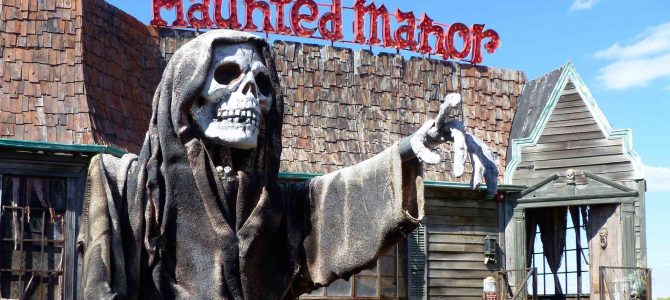
Just in time for Halloween, a social scare-tale is playing out across the country. Well, actually, an isolated incident has taken place with a lone crank targeting a holiday event, but still, the horror!
The impetus for change is Ron Thomas, a mental health activist whose schizophrenic son died at the hands of police years ago. What does Thomas’ tragic experience have to do with a Halloween theme park? I am not sure I could tell you. While there is a zeal to his complaints, there was little curiosity or analysis in his accusations.
Steve Lopez of the Los Angeles Times details how Thomas caused Knotts Berry Farm to close its Halloween-themed amusement park, called FearVR: 5150. Curiously, Thomas expected to be offended by the theme park, yet went anyway. Now, if I find myself offended by an activity, I take action by not engaging in that activity. That is not possible for today’s social justice warriors. Avoiding offense is never an option. Banishing that activity, and preventing others from any possible enjoyment they derive from it, is the only acceptable result.
While Thomas did head over to the attraction, he never got in—the lines were too long. “Instead, he talked to people as they exited and asked them to describe FearVR. They told him they were strapped into seats as if being admitted to a hospital, and then were transported into a frightening scene of mayhem,” Lopez writes. Therefore any outrage and action taken as a result is the result of hearsay.
Thomas Found What He Was Looking For
Yet Thomas went on to complain that the park “perpetuates stereotypes” about mentally ill people. But the use of a mental hospital for psychological fright purposes clearly derives from cinema. Mental asylums have long been a film setting, used so extensively they’ve become a trope in horror movies. Moreover, the attraction could hardly be described as an accurate portrayal of contemporary mental health facilities for other reasons.
FearVR patrons were stalked by a patient described as possessing demonic powers. Other elements of the exhibit included the paranormal and zombies. “The whole thing sounded wildly inappropriate to Thomas, whose son was in and out of mental facilities in his years-long struggle with schizophrenia. ‘It’s so insensitive,’ said Thomas.’” When Thomas says the attraction was confirming hurtful stereotypes, he is also suggesting that ghosts, demons, and zombies are elements commonly affiliated with the mental health field.
The Orange County chapter of the National Alliance on Mental Illness also approached organizers with grievances. The park officials then declared they would drop the “5150” designation.
The virtual reality experience is actually built around paranormal, zombie-like activity in a medical hospital setting. Cedar Fair [Knott’s parent company] recognizes the perception of the experience has raised concerns around the insensitivity to the stigmas surrounding mental health.… Part of the confusion stems from the use of the code 5150 in the experience’s original name. For that reason, the name has been changed to FearVR.
Not acceptable! These activists demand blood! Or, at least, some red ink needs to flow. “Thomas said changing the name, but not the content, wasn’t good enough,” Lopez wrote. NAMI chapter President Jim Leyerle also received the announcement but was hardly placated: “he thought that was a step in the right direction, but he wasn’t entirely satisfied and requested a meeting with Knott’s officials.”
Journalists Give Grievance-Mongers a Lift
It never occurs to Lopez, as is often the case with sympathetic journalists, to ask who these authorities are that they need to be “satisfied.” How are they in any position to demand such? Lopez approached this story by assuming guilt, which includes the assumption that any demands need to be met. His column declares early, “Here’s the story; you be the judge.” However this even-handed declaration is compromised by his opening sentence: “The folks who run Knotts Berry Farm did a lousy thing”—just in case you didn’t have the energy to judge for yourself.
The columnist also tips a biased hand with an assumptive query. “The obvious question is this: If it wasn’t meant to be a mental institution, why was 5150 originally in the name?” Except, Knotts never said it “wasn’t meant to be.” Their statement declares it is in fact using that setting, noting that the attraction’s focus on other-worldly paranormal and zombie-like elements doesn’t represent contemporary mental health realities.
This distinction is too much for the aggrieved to comprehend. When the activist crowd finds itself in a froth over an issue, facts are rarely in play. Countering their claims with accuracy does little to curtail the outrage. The pitchforks are already in hand. Nothing will pacify them short of retribution.
Appeasement Feeds the Monsters
Despite the name change, Lopez, Thomas, and the OC-NAMI all got their scalp. In a later email Knotts Berry Farm alerted the Times writer, “We have decided to close the attraction.” This was the wrong decision, for the same reason you do not pay kidnappers a ransom: appeasement only encourages more of the activist behavior.
Note well that when activists demand satisfaction they are rarely ever satisfied. To wit, the reaction from Lopez is hardly that of a sated SJW. “My first thought: Bravo! But another line in the email made me wonder if Knott’s was taking blame, or pointing a finger.” Of course, as soon as an entity retracts in the fashion you demanded, the first reaction needs to be critical.
Someday businesses may realize appeasement is bad business. Placating a group that was never your customer base does not lead to financial reward. Also, as this case continues to prove, satisfying their demands usually leads to them delivering scorn.
In the meantime, the general public mutes its holiday revelry. Go forth, and enjoy your sanitized frights that are approved by the proper cultural authorities. Just understand the scariest part: these social cranks are only becoming more empowered.









